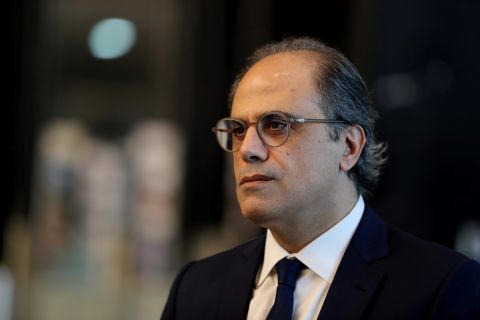Albawaba
Ankara
"There is one thing that, even if it were considered essential, no student movement or urban revolt or global protest would ever be able to do. That is to occupy the soccer field on a Sunday," Italian novelist Umberto Eco writes in an essay on sports.
Although this idea may sound absurd and extreme at first, you will soon perceive and appreciate the power of this social phenomenon by merely studying daily life in Turkey: How many debates about a recent match do you hear? How many arguments do you witness between the supporters of different soccer teams? How many posters or symbols of a certain soccer team do you come across each day? How many ads on the TV do you watch that use soccer as a means of promotion? How many matches do you see on each TV channel every night? How many pages of newspapers do you find devoted to soccer every day? How many opinions did you happen hear, or were lucky enough not to hear, following the recent match between the national teams of Hungary and Turkey? As a matter of fact, "soccerism" is a profound element in sociality and manhood. "Soccer is Man, Soccer is Society," as Eco said. Eco pointed out the enormous social importance of soccer in his remark about the occupation of a soccer pitch. People can occupy the headquarters of a party or a state building, and some might approve or be secretly pleased. Yet if it is the soccer field that is occupied, religious folk, rightists, leftists, the state, the judiciary, anarchist unions, intellectuals, children, women, the elderly, the upper classes and the lower classes would all be screaming out in anger. Thus, soccer is a deep and wide focus of collective sensibility with which no one tolerates interference.
Social analysts distinguish masculine sports like soccer, rugby and American football from other more feminine (less vigorous) sports such as swimming, tennis, horseback riding, sailing, golf, etc. They are usually practiced by the "elite", or true aficionados of sport and which are participated in, as opposed to being watched, talked about or supported.
“One for all, all for one!” Soccer certainly is different from other team sports that involve a ball and that can create the excitement of competition such as basketball, volleyball or handball when seen in terms of polarizing public fascination and media attention. Why is this? These other sports actually require more specific expertise and more technical knowledge so that the ordinary citizen cannot easily understand and discuss them. Furthermore, they are not an expression of "symbolic violence," with spectators feeling as though they are engaged in an actual struggle similar to that of life itself. "One for all, all for one!" cries a Turkish soccer team before a match, just as soldiers would confirm their sense of solidarity before combat. "We have come here to die!" yell the fans during the match as if they were fighting in an actual holy war, which makes them feel like heroes.
Seemingly, soccer is the ideal sport for any kind of society or individual suffering from an identity crisis due to them being underestimated or feeling unimportant. Such people can pour their anger, their complexes, and their unfulfilled desires into soccer.
Those fans who shout against the opposing team may really be bursting with anger against their boss or their superiors whom they secretly but totally hate. The fan who yells and gesticulates in front of his favorite team is performing physical exercise as if he were actually involved in the struggle, which he "wants" to consider a matter of vital importance.
Following the match, the fan typically forms opinions and makes judgments and polemic remarks. At this point, physical energies are no longer in play, so the competition shifts to a level of "opinion forming." This allows people to take stances, to voice ideas, to suggest solutions or strategies and to make observations without exposing themselves to any legal action or moral suspicion. They are discussing something that occurs outside of themselves and which in actual fact has nothing to do with the reality they find themselves in.
In other words, fans are able to play the role of influential figures without any suffering, responsibility, duty or political debate. "For the male adult, it's like little girls behaving as ladies: a pedagogical game which teaches you how to occupy your proper place," says Eco.
Soccer is an important social phenomenon in Mediterranean and South American countries since the nature of game is suited to the warm-blooded temperaments and the cultural concerns of their citizens. These people may suffer heart attacks in the grandstands, or referees may pay for their Sunday fame with the risk of bodily harm at the hands of spectators. Passengers who get off buses are wounded by shards of glass from thrown stones. Fans also drive drunkenly through the streets in wild celebrations and crash into trucks. Reflecting national complexes, Pierre Bourdieu, a leading French theorist, says that the glorification of sports always implies a certain anti-intellectualism. This is because the proportion of those practicing a sport declines as one moves down the social hierarchy, whereas the proportion of those glued to the TV to see the most popular sports, such as soccer or rugby, declines as one rises in the social hierarchy.
In Turkey, however, this does not appear to be so. Analysts say this situation can most probably be explained by the fact that in this country, even intellectuals, and other influential figures, still lack self-confidence and suffer complexes common to the lower classes.
Possibly they secretly feel that they don't really deserve their image as, "important social agents," or maybe they still feel like inadequate individuals in many aspects of life.
Soccer matches, besides reflecting personal complexes, are also ideal for the reflection of national complexes. Turkey, suffering increasingly from an inferiority complex when they compare themselves with Western countries, makes a clear statement of its anger at being underestimated and isolated by these countries when it plays against European nations.
Following the country's first victory over Hungary in 39 years, an entire nation of men, women, children, families and grandmothers were crying in joy, “Turkey is the greatest," they shouted amid floods of tears.
"Turkish lions! Get ready Europe, the Turks are coming!" and "Yaba daba doo," were the front-page headlines of the major dailies the day after the match.
Turkish politicians and government figures, who are well aware of the potential for social crisis due to the general public’s unhappiness and sense of inferiority, promote soccer. They exploit it both as a means of releasing public tension and diminishing the national inferiority complex, and also as a means for misdirecting the country’s agenda.
Politicians are happy to see that people today, instead of criticizing the government's record, concentrate on the record of their respective soccer teams.
Instead of asking any awkward questions about an international agreement signed between a minister and his foreign counterpart, they ask questions about an agreement between a soccer team and a newly transferred player.
Instead of criticizing the job done by the finance minister, they discuss the job done by the coach. Of course in order to talk about the performance of the finance minister, you have to have some idea about economics. And political figures know this only too well.
© 2000 Al Bawaba (www.albawaba.com)








